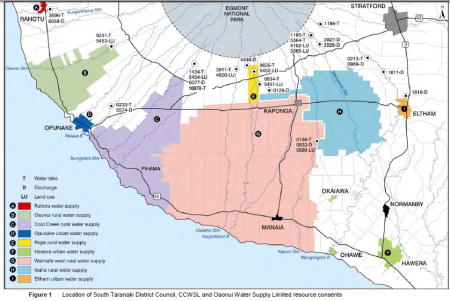At today’s public hearings on the Proposed South Taranaki District Plan, Climate Justice Taranaki argued that avoiding adverse effects on human drinking water sources must be added to the district plan.
“Under the proposed plan, the district council is not required to assess explicitly the potential adverse effects on drinking water sources, when considering resource consents. This is just not good enough. All water supplies, whether they’re for rural or urban communities, should be protected,” said Catherine Cheung of Climate Justice Taranaki.
This issue was first raised by Taranaki District Health Board (TDHB) in their submission on the proposed plan. The DHB also recommended that Schedule 5 on Significant Waterbodies be amended, to specifically ensure the provision and protection of human drinking water sources. Under the Health Act and the National Environmental Standards on Sources of Human Drinking Water, council, being the district’s main drinking-water supplier, has the responsibility to protect our drinking water sources.
“Our group fully supports the DHB’s recommendations. We were shocked when we read that both recommendations were rejected in Council Officers’ report,” continued Cheung.
Climate Justice Taranaki will be speaking again at subsequent hearing sessions concerning hazardous substances, energy and other issues, in late June.
— END —
Read our hearings statement here.
See maps of South Taranaki’s water supplies below, from South Taranaki Water Supply Monitoring Programme Annual Report 2014-2015.





 Posted by Climate Justice Taranaki
Posted by Climate Justice Taranaki 

 “The government’s announcement to open up
“The government’s announcement to open up 
![womad sticker wide [947804]](http://web.archive.org./web/20160616221742im_/https://climatejusticetaranaki.files.wordpress.com/2016/03/womad-sticker-wide-947804.jpg?w=450) It is WOMAD weekend in New Plymouth again – a time to celebrate the World of Music, Arts and Dance, to promote cross-cultural awareness and tolerance. How wonderful!
It is WOMAD weekend in New Plymouth again – a time to celebrate the World of Music, Arts and Dance, to promote cross-cultural awareness and tolerance. How wonderful!

